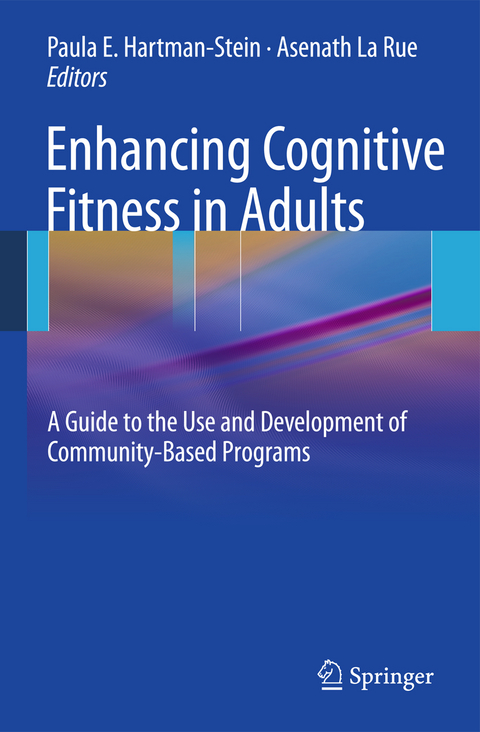
Enhancing Cognitive Fitness in Adults
Springer-Verlag New York Inc.
978-1-4614-4767-2 (ISBN)
Late life is characterized by great diversity in memory and other cognitive functions. Although a substantial proportion of older adults suffer from Alzheimer’s disease or another form of dementia, a majority retain a high level of cognitive skills throughout the life span. Identifying factors that sustain and enhance cognitive well-being is a growing area of original and translational research.
In 2009, there are as many as 5.2 million Americans living with Alzheimer’s disease, and that figure is expected to grow to as many as 16 million by 2050. One in six women and one in 10 men who live to be at least age 55 will develop Alzheimer’s disease in their remaining lifetime. Approximately 10 million of the 78 million baby boomers who were alive in 2008 can expect to develop Alzheimer’s disease. Seventy percent of people with Alzheimer’s disease live at home, cared for by family and friends. In 2008, 9.8 million family members, friends, and neighbors provided unpaid care for someone with Alzheimer’s disease or another form of dementia. The direct costs to Medicare and Medicaid for care of people with Alzheimer’s disease amount to more than $148 billion annually (from Alzheimer’s Association, 2008 Alzheimer’s Disease Facts and Figures). This book will highlight the research foundations behind brain fitness interventions as well as showcase innovative community-based programs to maintain and promote mental fitness and intervene with adults with cognitive impairment. The emphasis is on illustrating the nuts and bolts of setting up and utilizing cognitive health programs in the community, not just the laboratory.
Paula Hartman-Stein, Ph.D., is a clinical psychologist, founder of the Center for Healthy Aging, and director of geriatric psychology for Summa Health System. She received her doctoral degree from Kent State University in 1982, going on to complete her post-doctoral training in the departments of medicine and surgery at Akron General Medical Center, and her geropsychology training at Case Western Reserve University. She is an assistant professor of psychology at Northeastern Ohio Universities College of Medicine, adjunct associate professor of psychology at Kent State University, and senior fellow in the Institute for Life Span Development and Gerontology at University of Akron. In 2006 she received the Alfred M. Wellner Ph.D. Senior Career Psychologist Award recognizing excellence in a health service provider in psychology by the National Register of Health Service Providers in Psychology. She is a fellow and past president of APA's Division 12 (Clinical Psychology) and a member of the National Academy of Practice in Psychology of the National Academies of Practice, Psychologists in Long-Term Care, American Gerontological Society of America, American Society on Aging, and Association for the Advancement of Psychology. Asenath LaRue, Ph.D. is a neuropsychologist with interests in both normal cognitive aging and dementia. She has been a faculty member of the Neuropsychiatric Institute at UCLA and the Department of Psychiatry at the University of New Mexico, and became a senior scientist at the Wisconsin Alzheimer's Institute, Department of Medicine, University of Wisconsin-Madison in 2004. She has been a clinician, researcher, and educator in the fields of aging and dementia for more than 25 years. She is on the board of directors for the Alzheimer's Association, a Fellow of the American Psychological Association, and a member of the National Academy of Neuropsychology.
Part I: Research Foundations of Brain Fitness Interventions.- Brain plasticity in aging and early-stage dementia.- Lessons learned from training interventions.- Part II: Community-Based Programs to Enhance and Sustain Healthy Aging.- Memory enhancement strategies: What is known, and what is new?.- Keys to a Sharp Mind: Results of a model program designed by retirees in an independent living community.- The Odyssey program: Friendly competition to boost cognitive fitness.- Spelling Bees for Older Adults: Creating an old fashioned cognitive–social event in your community, or Why does the AARP host a nationwide spelling contest for people over 50? .- Intergenerational schools: Educational models for the future? .- Programs emphasizing engagement in the arts.- TimeSlips and other narrative therapies: How story telling helps older adults.- Home and cognitive fitness: Utilizing "Posit Science," electronic games, and Internet programs at home, in senior centers, and in retirement communities.- Exercise and cognitive fitness in late life: Recommendations from an exercise physiologist.- University Without Walls for seniors: Use of teleconferencing to reduce isolation and increase cognition.- Part III: Cognitive Wellness Interventions for Older Adults with Cognitive Impairment.- Helping the older adult with mild cognitive impairment.- Programs that caregivers can implement: What Maria Montessori knew about helping frail elders.- How can speech therapy promote cognitive skills.- The role of medications and supplements.
| Zusatzinfo | 17 Illustrations, black and white; XXII, 499 p. 17 illus. |
|---|---|
| Verlagsort | New York, NY |
| Sprache | englisch |
| Maße | 155 x 235 mm |
| Themenwelt | Geisteswissenschaften ► Psychologie ► Klinische Psychologie |
| Medizin / Pharmazie ► Medizinische Fachgebiete ► Geriatrie | |
| Medizin / Pharmazie ► Medizinische Fachgebiete ► Neurologie | |
| Schlagworte | Adult communities • Alzheimer's disease • Brain Fitness • Brain Plasticity • Cognitive Enhancement • Cognitive impairment • cognitive skills • dementia • Healthy Aging • Intergenerational schools • memory disorders • Memory enhancement • Mild Cognitive Impairment • Narrative therapy • Odyssey Program • Pathological aging • Posit Science • Retirement communities • Senility • Senior centers • Senior communities • Story telling therapy |
| ISBN-10 | 1-4614-4767-4 / 1461447674 |
| ISBN-13 | 978-1-4614-4767-2 / 9781461447672 |
| Zustand | Neuware |
| Haben Sie eine Frage zum Produkt? |
aus dem Bereich


